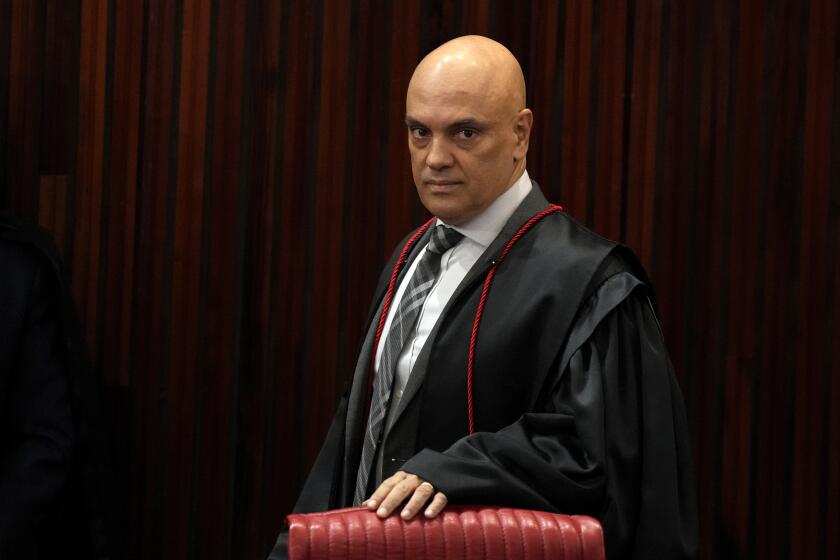Iran reply on nuclear deal ‘inadequate’
Iran’s response Thursday to a proposed deal to transform its controversial nuclear material into fuel for a medical reactor is “inadequate,” a senior Western diplomat said, adding that the reply failed to address key U.S. and European concerns about Tehran’s nuclear intentions.
Iran appeared to seek modifications to the proposal to temporarily move most of its enriched uranium to Russia and France to be further refined and shaped for use in a medical reactor after a delay of nearly a week and a flurry of contradictory signals.
The proposal would have depleted Iran’s stockpile of nuclear fuel below the threshold necessary for making a single nuclear bomb, possibly creating diplomatic breathing room for a broader agreement between Tehran and those worried about its atomic research program.
But according to the diplomat, Iran wants to send its uranium abroad in smaller batches over an undetermined stretch of time rather than the lump transfer by year’s end outlined under the proposal offered by International Atomic Energy Agency chief Mohamed ElBaradei.
Such a change would allow Iran to quickly replenish its stock.
Further disappointing the West, Tehran did not submit a formal written response as expected, the diplomat said. Instead, Iran’s envoy to the Vienna-based United Nations atomic energy agency, Ali Asghar Soltanieh, described the offer to ElBaradei.
In Washington, State Department spokesman Ian Kelly, while refusing to describe the Iranian response, said American officials were working with ElBaradei on the issue.
“We need further clarification,” he said. “And I think it’s also fair to say that we need to have a formal response from Iran at this point.”
Diplomats were publicly mum about the Iranian offer, suggesting no immediate resolution of a years-long standoff over Iran’s nuclear ambitions. ElBaradei described the proposal as an “initial response,” indicating there would be more negotiation. But neither he nor other diplomats had publicly disclosed details of the Iranian response by Thursday night.
“The director-general is engaged in consultations with the government of Iran as well as all relevant parties, with the hope that agreement on his proposal can be reached soon,” the U.N. nuclear watchdog agency said in a terse news release.
Iranian officials and commentators have said for days that Iran would accept the U.S.-backed proposal but seek amendments before signing on. President Mahmoud Ahmadinejad earlier Thursday said the West had changed its posture from “confrontation” to “cooperation” over Iran’s nuclear ambitions, suggesting that he welcomed the deal.
Under the original proposal, Iran was to send about 2,500 pounds of its low-enriched uranium to Russia for further refinement and then on to France to be shaped into fuel rods for the medical reactor.
The U.S., Russia and France have already signed off on the original plan, praised by diplomats and security experts as a way to temporarily allay Western fears that Iran could quickly turn its enriched uranium into fuel for a bomb. The proposal could serve as a possible cornerstone for future negotiations over Iran’s nuclear program, they said.
Iranian officials have hinted that they wanted to amend the proposal, perhaps by decreasing the quantity of enriched uranium shipped abroad or stretching out the proposed timetable later than year’s end.
But France has already publicly insisted that Iran must send the bulk of its enriched-uranium supply abroad and has demanded that Tehran not tinker with the details. “We want Iran to respond clearly and positively to the proposed agreement,” French Foreign Ministry spokesman Bernard Valero said, according to Agence France-Presse.
Russian diplomats told The Times that they would like the plan to begin “as soon as possible.”
Kelly told reporters that Washington remained “united with our Russian and French partners in support of the IAEA draft agreement,” but declined to speculate on Washington’s response to an Iranian attempt to amend the plan.
In Iran, multiple official voices have spoken out about the proposal. Although Ahmadinejad appears to have welcomed it, parliamentary speaker Ali Larijani and others have said Iran could further enrich its uranium to the 20% purity required for the medical reactor. Opposition leader Mir-Hossein Mousavi also cast doubt on the proposal, saying Iran was backing itself into a corner in which it would either have to betray its own scientists or expose the nation to sanctions.
A breakdown of the talks would increase the possibility of harsh economic sanctions on Iran, including measures approved this week by a congressional committee.
Ahmadinejad, speaking to supporters in the northeastern city of Mashhad during a religious holiday, praised the offer as a victory for Iranian steadfastness, saying the West had changed its policies from “confrontation to cooperation” as a result of Iran’s “resistance against enemies,” presumably the U.S. and its allies.
“In the past they said that we had to halt our nuclear activities,” he said in a speech broadcast on state television. “But today they say, ‘Come consult about finding solutions for world problems,’ and they want to cooperate for the exchange of fuel and development of nuclear technology and establishing a nuclear plant.”
Although Iran’s supreme leader, Ayatollah Ali Khamenei, has final say on important matters of state, including the nuclear program, Ahmadinejad also influences the policy, which is formulated mostly by the Supreme National Security Council, a body that includes the heads of all the branches of government and the chiefs of the military and domestic security forces.
--
daragahi@latimes.com
Special correspondents Ramin Mostaghim in Tehran and Julia Damianova in Vienna contributed to this report.
More to Read
Sign up for Essential California
The most important California stories and recommendations in your inbox every morning.
You may occasionally receive promotional content from the Los Angeles Times.











